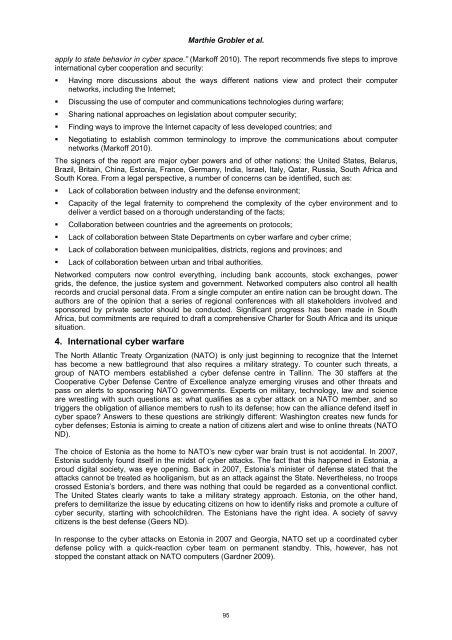6th European Conference - Academic Conferences
6th European Conference - Academic Conferences
6th European Conference - Academic Conferences
Create successful ePaper yourself
Turn your PDF publications into a flip-book with our unique Google optimized e-Paper software.
Marthie Grobler et al.<br />
apply to state behavior in cyber space.” (Markoff 2010). The report recommends five steps to improve<br />
international cyber cooperation and security:<br />
Having more discussions about the ways different nations view and protect their computer<br />
networks, including the Internet;<br />
Discussing the use of computer and communications technologies during warfare;<br />
Sharing national approaches on legislation about computer security;<br />
Finding ways to improve the Internet capacity of less developed countries; and<br />
Negotiating to establish common terminology to improve the communications about computer<br />
networks (Markoff 2010).<br />
The signers of the report are major cyber powers and of other nations: the United States, Belarus,<br />
Brazil, Britain, China, Estonia, France, Germany, India, Israel, Italy, Qatar, Russia, South Africa and<br />
South Korea. From a legal perspective, a number of concerns can be identified, such as:<br />
Lack of collaboration between industry and the defense environment;<br />
Capacity of the legal fraternity to comprehend the complexity of the cyber environment and to<br />
deliver a verdict based on a thorough understanding of the facts;<br />
Collaboration between countries and the agreements on protocols;<br />
Lack of collaboration between State Departments on cyber warfare and cyber crime;<br />
Lack of collaboration between municipalities, districts, regions and provinces; and<br />
Lack of collaboration between urban and tribal authorities.<br />
Networked computers now control everything, including bank accounts, stock exchanges, power<br />
grids, the defence, the justice system and government. Networked computers also control all health<br />
records and crucial personal data. From a single computer an entire nation can be brought down. The<br />
authors are of the opinion that a series of regional conferences with all stakeholders involved and<br />
sponsored by private sector should be conducted. Significant progress has been made in South<br />
Africa, but commitments are required to draft a comprehensive Charter for South Africa and its unique<br />
situation.<br />
4. International cyber warfare<br />
The North Atlantic Treaty Organization (NATO) is only just beginning to recognize that the Internet<br />
has become a new battleground that also requires a military strategy. To counter such threats, a<br />
group of NATO members established a cyber defense centre in Tallinn. The 30 staffers at the<br />
Cooperative Cyber Defense Centre of Excellence analyze emerging viruses and other threats and<br />
pass on alerts to sponsoring NATO governments. Experts on military, technology, law and science<br />
are wrestling with such questions as: what qualifies as a cyber attack on a NATO member, and so<br />
triggers the obligation of alliance members to rush to its defense; how can the alliance defend itself in<br />
cyber space? Answers to these questions are strikingly different: Washington creates new funds for<br />
cyber defenses; Estonia is aiming to create a nation of citizens alert and wise to online threats (NATO<br />
ND).<br />
The choice of Estonia as the home to NATO’s new cyber war brain trust is not accidental. In 2007,<br />
Estonia suddenly found itself in the midst of cyber attacks. The fact that this happened in Estonia, a<br />
proud digital society, was eye opening. Back in 2007, Estonia’s minister of defense stated that the<br />
attacks cannot be treated as hooliganism, but as an attack against the State. Nevertheless, no troops<br />
crossed Estonia’s borders, and there was nothing that could be regarded as a conventional conflict.<br />
The United States clearly wants to take a military strategy approach. Estonia, on the other hand,<br />
prefers to demilitarize the issue by educating citizens on how to identify risks and promote a culture of<br />
cyber security, starting with schoolchildren. The Estonians have the right idea. A society of savvy<br />
citizens is the best defense (Geers ND).<br />
In response to the cyber attacks on Estonia in 2007 and Georgia, NATO set up a coordinated cyber<br />
defense policy with a quick-reaction cyber team on permanent standby. This, however, has not<br />
stopped the constant attack on NATO computers (Gardner 2009).<br />
95

















